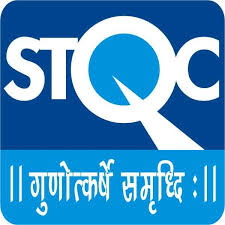October 20, 2011. CEIBS -- Ambassador of India H.E. Dr S. Jaishankar was among the diplomats, scholars and business executives from India and China who today gathered at the CEIBS Shanghai campus to discuss the changing face of India-China business relations, as well as cultural & academic ties between the two countries. An audience of about 70, including a number of CEIBS students (many from India) and the media turned out for the seminar on “India-China: Towards Mutual Partnership”. The event was jointly organised by the Consulate General of India and CEIBS.
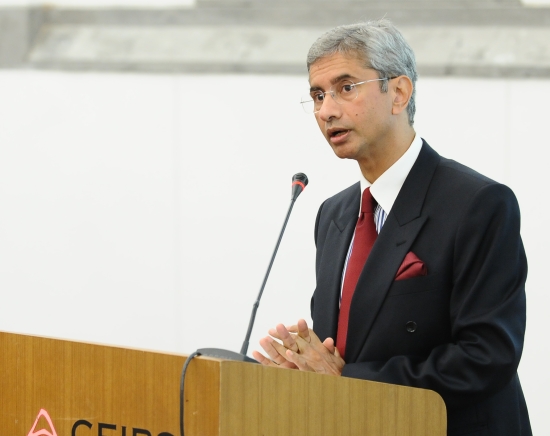
Ambassador of India H.E. Dr S. Jaishankar
Also among the day’s speakers were:
- Consul General of India Ms. Riva Ganguly Das;
- Chairman CII-IBF & CEO, Infosys China Mr. Rangarajan Vellamore;
- Professor Bai Yun, Department of Geo-Technical Engineering, Tongji University;
- Assistant Professor, School of Political Science and International Relations, Tongji University, Ms. Indira Ravindran; and
- Initiator, West Heavens Project Mr Tsong-zung.
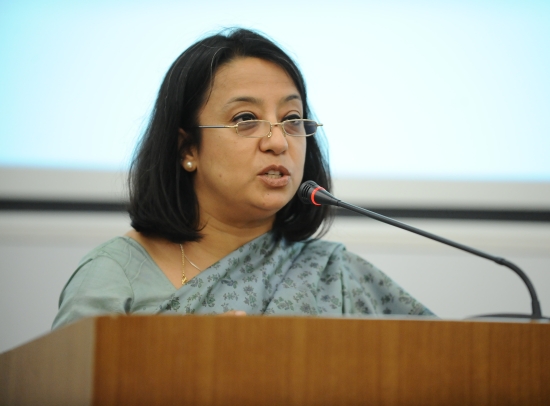
Consul General of India Ms. Riva Ganguly Das
CEIBS Vice President & Dean Prof. John Quelch, the moderator for the opening session, explained that today’s event was a commemoration of October 2 (Mahatma Gandhi’s birthday) being celebrated as International Day of Non-violence. It was also, he added, an opportunity for the school to foster Sino-Indian dialogue. Stressing the importance of the relationship between the two countries, Dean Quelch told the audience that it was CEIBS’ role, “as an international business school in Asia, to promote” dialogue between both sides. He ended by expressing the hope that the event will become an annual one, possibly staged across both countries. “I hope this event will benefit the business community and foster relations between India and China,” said Dean Quelch ahead of inviting Consul General of India Ms. Riva Ganguly Das to the podium.
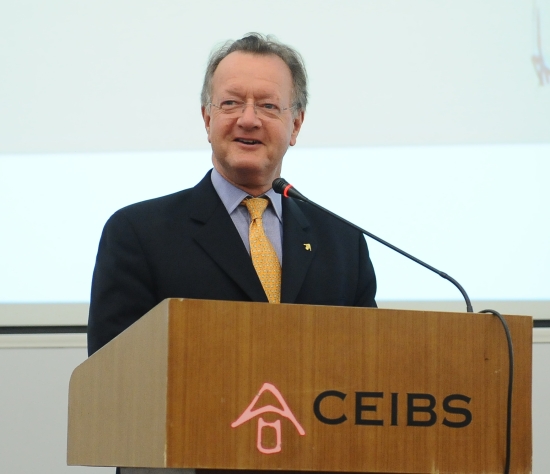
CEIBS Vice President & Dean Prof. John Quelch
In her address, the Consul General expounded on the significance of the International Day of Non-violence and Mahatma Gandhi’s global impact. Today’s seminar, she said, was a fitting tribute to his memory, as participants explored ways to further strengthen Sino-Indian ties and discuss the common challenges faced.
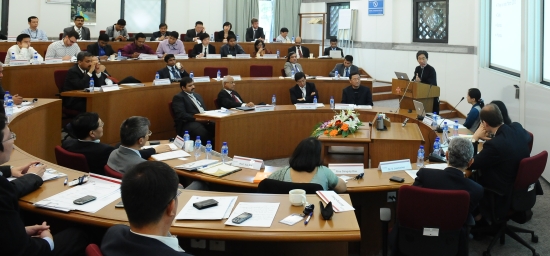
Mahatma Gandhi’s dedication to world peace and poverty reduction underpinned Ambassador of India H.E. Dr S. Jaishankar’s keynote speech titled “Leveraging China”. “The future of India-China relations is going to determine world peace and poverty control,” the Ambassador said. He used the rest of his speech to highlight eight ways in which India can leverage its relationship with China for mutual benefit. Among his points:
- As it moves to implement its own soon-to-be-unveiled 12th 5-Year Plan, India can take lessons from how China uses its economic muscle for national development. The Ambassador spoke of the 5 indicators that show where India wants to be within the next 5 years: power (100 gigawatts of capacity to be installed between 2012 and 2017); roads (28,000km to be built, compared to 14,000km in the last 5 years); railway (to be increased from 2,500km to 10,000km); steel (increased from 82 million tonnes to 142 million tonnes); cement (from 225 million tonnes to 540 million tonnes). “Leveraging China is the only way to accomplish these goals,” he said.
- The resources available in and from China. The Ambassador pointed out that many Indian companies have tapped into financing provided by Chinese firms, adding that the Indian Central Bank recently gave the nod for the Yuan to be a currency in which Indians can borrow. “China is seen as a financial power with the ability to offer credits, that’s a leveraging factor for India,” he added.
- Positive impact of Chinese entry into some sectors of the Indian economy, for example, the significant reduction in telecom rates (from 2.5 RMB a minute to 1RMB for 8 to 9 minutes).
Other leveraging opportunities cited included: location -- Indian companies can use China as a foothold to go global; exchange of best practices, for example in areas such as food safety; collaboration on global-level issues such as climate change, on national-level issues such as labour migration, and on reforms that will occur in the wake of the recent financial crises. The Ambassador also pointed out that India stands to gain a lot by leveraging China’s entry into other markets. This, he said, paves the way for India to enter.
The key, he said, was for both countries to work together, making their relationship increasingly more stable.
Turning his attention to ways in which China can leverage India, the Ambassador cited IT and Pharma as two potential sectors. He cautioned, however, that strengthening the relationship between the two countries and fostering collaboration in various sectors would require commitment and hard work. Some examples of ongoing initiatives that will be helpful, he said, include recent approval for Chinese to be taught in India’s middle schools, and regularly held business forums. From a cultural aspect, the Ambassador also spoke of the need to move ahead with the production of an encyclopaedia -- in both languages -- of the two countries’ historical cultural heritage.
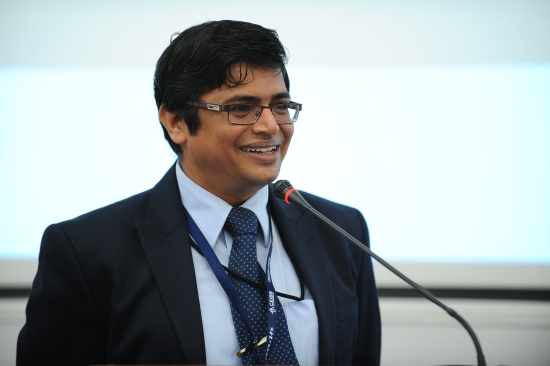
Chairman CII-IBF & CEO, Infosys China Mr Rangarajan Vellamore
Next, Chairman CII-IBF & CEO, Infosys China Mr Rangarajan Vellamore shared his views during a discussion on “Changing Face of India-China Business Relations”. He believes companies that have been successful in China, helping to generate numerous jobs over the past two decades, can likely replicate that level of success if they invest in India. Mr Rangarajan Vellamore was also optimistic that bilateral trade between the two countries will increase in the next 5 years and the trade imbalance would soon be resolved as a result of ongoing “discussions at the highest levels”. He also spoke of the important role that cultural and academic exchange will play in fostering the Sino-Indian relationship. The session was rounded out with a presentation by Professor Bai Yun, Department of Geo-Technical Engineering, Tongji University. He touched on Sino-Indian bilateral trade and how it could be significantly improved if a tunnel were constructed across the Himalayas (also benefitting Nepal).
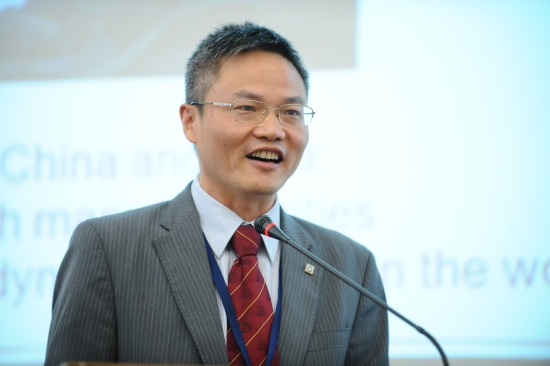
Professor Bai Yun, Department of Geo-Technical Engineering, Tongji University
The moderator for Session 1 was Prof Zhao Gancheng, Senior Fellow and Director, Department of South Asian Studies, SIIS who welcomed the day’s event as an opportunity to focus on the positive aspects of India-China ties.
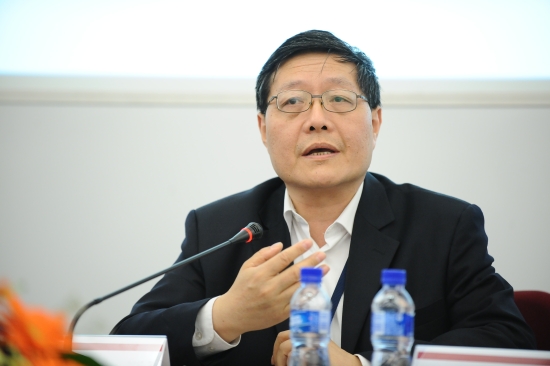
Prof Zhao Gancheng, Senior Fellow and Director, Department of South Asian Studies, SIIS
The day’s final session on “China-India: Cultural & Academic Contacts” was moderated by Prof. David Gosset, Director of Academia Sinica Europea, CEIBS who touched on the multi-polarity of the 21st Century within a cultural and intellectual context.
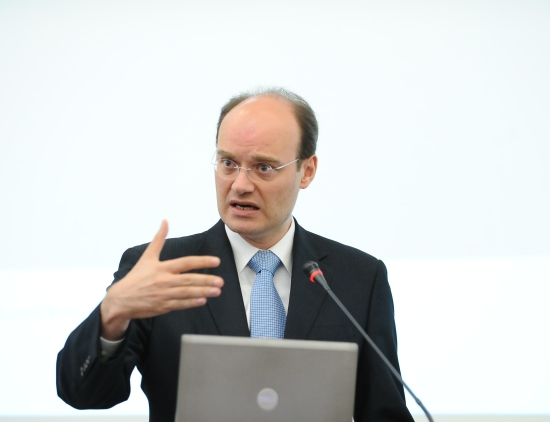
Prof. David Gosset, Director of Academia Sinica Europea, CEIBS
It saw presentations from Initiator, West Heavens Project Mr Tsong-zung and Assistant Professor, School of Political Science and International Relations, Tongji University, Ms. Indira Ravindran. Mr. Tsong-zung gave an overview of his project which, launched last year, aims to use art and culture (in film format) to convey lessons about India.
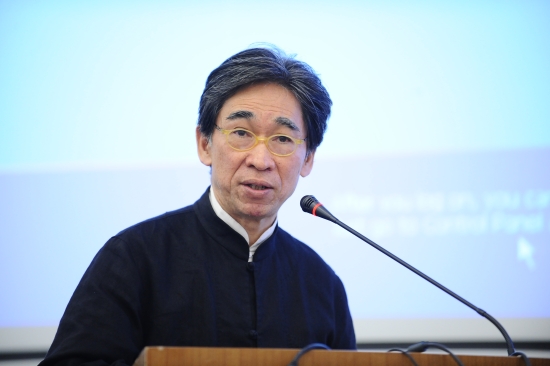
Initiator, West Heavens Project Mr Tsong-zung
In her address, Ms. Indira Ravindran spoke of the significant role that cultural and academic exchanges can play in the Sino-India relationship. “The business community has always led the way (in fostering this relationship); we can take a cue from them,” she said. “Not only would it be nice to collaborate, it would be irresponsible not to.”
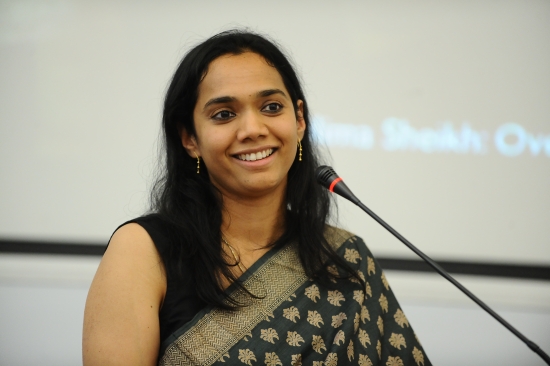
Assistant Professor, School of Political Science and International Relations, Tongji University, Ms. Indira Ravindran
The seminar ended after a lively Q&A session, with dialogue continuing over lunch.
The corresponding weblink is











